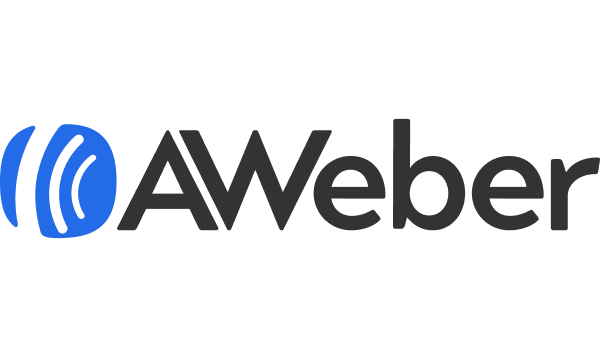AWeber vs Mailchimp: Email Marketing Showdown Winner
Capterra, G2, Trustpilot, and Reddit to create an objective evaluation. Learn more about our review methodology
Picking an email marketing platform feels a bit like dating sometimes — you’re looking for that perfect match that just gets what your business needs. Trust me, I’ve been down this road before with clients, and it’s rarely a straightforward decision.
After testing both AWeber and Mailchimp extensively (and dealing with their respective quirks), I wanted to share some real-world insights on these popular platforms. This isn’t just about features and pricing — it’s about which one actually delivers when the rubber meets the road.
AWeber vs Mailchimp — Quick Comparison
Feature Overview
AWeber
Mailchimp
Best For
Small businesses, solopreneurs, beginners
Growing brands, advanced marketing needs
Pricing
Free plan + paid plans from $14.99/month
Free plan + paid plans from $13/month
Ease of Use
Very beginner-friendly, simple setup
User-friendly with more advanced tools
Value for Money
Great for basic email marketing needs
Better for feature-rich, scalable campaigns
Strengths & Weaknesses
Overall Strengths
Overall Weaknesses
AWeber
Affordable, simple automation, good templates
Limited advanced automation, fewer integrations
Mailchimp
Powerful automation, extensive integrations
Higher pricing at scale, complex pricing structure
AWeber vs Mailchimp — Feature Comparison
AWeber
Mailchimp
Email Campaigns
- Drag-and-drop editor
- Pre-built templates
- AMP for interactive emails
- RSS-to-email campaigns
- Advanced email editor
- Dynamic content blocks
- Pre-built templates & layouts
- Product recommendations for ecommerce
Automation
- Basic automation flows
- Autoresponders
- Tag-based triggers
- Cart abandonment emails (Pro)
- Multi-step automation builder
- Behavior-based triggers
- Conditional branching
- Customer journey mapping
Landing Pages & Forms
- Customizable signup forms
- Basic landing page builder
- Popups & integrations with WordPress
- Mobile-responsive designs
- Drag-and-drop landing page builder
- Embedded & popup forms
- Lead capture integrations
- A/B testing forms and pages
Segmentation & Personalization
- Tag-based segmentation
- Subscriber activity filters
- Basic dynamic content
- Custom fields for personalization
- Advanced segmentation rules
- Predictive demographics
- Dynamic content for personalization
- Behavioral targeting
Reporting & Analytics
- Basic email reports
- Open & click tracking
- Sales tracking (ecommerce)
- Subscriber activity reports
- In-depth reporting dashboard
- Revenue tracking & attribution
- Engagement & conversion metrics
- Audience growth analytics
Integrations
- 750+ integrations
- WordPress & Shopify apps
- Zapier support
- API access
- 300+ integrations
- Native Shopify & WooCommerce apps
- CRM & ecommerce platforms
- API & developer tools
I’ve spent countless hours in both platforms, and here’s what jumped out at me:
When it comes to creating emails, AWeber keeps things pretty straightforward — their drag-and-drop editor isn’t fancy but gets the job done. I really liked their AMP for emails feature, which lets subscribers interact with your content without leaving their inbox.
Mailchimp’s editor feels more polished and offers those dynamic content blocks that change based on who’s viewing them — super helpful if you’re running an online store.
The biggest difference I noticed? Automation capabilities. AWeber handles the basics well enough — you can set up decent autoresponders and trigger emails based on tags. But Mailchimp’s automation is in another league.
You can build these multi-step journeys that branch off in different directions depending on what your subscribers do. It’s like the difference between a basic flowchart and a choose-your-own-adventure book.
One thing that surprised me was the integration situation. AWeber claims 750+ integrations versus Mailchimp’s 300+, but the quality matters more than quantity. Mailchimp’s native Shopify and WooCommerce connections just worked better in my testing.
AWeber vs Mailchimp — Pricing Comparison
Subscriber Count
AWeber Pricing (Lite/Plus Plan)
Mailchimp Pricing (Standard Plan)
Key Differences
1,000
From $14.99/month
From $20/month
AWeber is cheaper at entry-level; Mailchimp offers more automation features.
2,500
From $29.99/month
From $39.50/month
AWeber provides basic automation; Mailchimp adds advanced segmentation.
5,000
From $49.99/month
From $70/month
Mailchimp includes more dynamic content tools; AWeber remains simpler.
10,000
From $69.99/month
From $100/month
AWeber more affordable for basic campaigns; Mailchimp supports multi-step automation.
25,000
From $149.99/month
From $230/month
AWeber stays budget-friendly; Mailchimp offers deeper reporting & integrations.
The price difference becomes pretty obvious when you look at the numbers:
For 1,000 subscribers: AWeber starts around $15/month while Mailchimp wants $20. By the time you hit 25,000 subscribers: AWeber asks for $150/month compared to Mailchimp’s $230.
That $80 monthly difference adds up to nearly $1,000 a year! Is it worth it? Well, that depends on whether you’ll actually use those fancy Mailchimp features or if you’re just paying for bells and whistles you’ll never touch.
I was initially drawn to AWeber’s more affordable pricing, but after using both, I realized why the cost difference exists. It’s like comparing a reliable sedan to a luxury car with all the add-ons — both get you where you’re going, but the experience is different.
AWeber vs Mailchimp — The Free Plans Review
AWeber Free Plan
Mailchimp Free Plan
Subscribers
Up to 500 subscribers
Up to 500 subscribers
Emails/Month
3,000 emails/month
1,000 emails/month
Automation
Basic autoresponders only
Single-step automation only
Landing Pages/Forms
Unlimited forms & landing pages
Unlimited forms & landing pages
Branding
AWeber branding on emails & forms
Mailchimp branding on emails & pages
AWeber lets you send 3,000 emails monthly to up to 500 subscribers. Mailchimp caps you at just 1,000 emails for the same subscriber count. Both slap their branding on your emails (annoying but expected).
The higher email limit on AWeber’s free plan is genuinely useful if you’re sending frequent updates to a small list. I was hitting Mailchimp’s limit way too quickly, which pushed me to upgrade sooner than I wanted.
AWeber vs Mailchimp — The Good, The Bad, and The Ugly
AWeber
Mailchimp
- Affordable pricing, especially for small lists
- Unlimited emails on all plans
- User-friendly drag-and-drop email builder
- Pre-built templates & email design flexibility
- 24/7 live customer support on all plans
- Built-in landing pages & signup forms
- Advanced automation and customer journeys
- Extensive integration ecosystem (300+ apps)
- Strong audience segmentation & personalization
- Built-in CRM & ecommerce tools
- Detailed reporting & revenue tracking
- Multi-channel marketing (email, SMS, social ads)
- Basic automation compared to Mailchimp
- Fewer advanced segmentation features
- Limited ecommerce tools & integrations
- Fewer analytics & reporting options
- No advanced behavioral triggers
- Template customization can feel dated
- Pricing increases steeply with list growth
- Free plan has lower email send limits
- Automation & advanced features gated on higher tiers
- Pay-per-contact pricing structure
- Steeper learning curve for advanced tools
- Mailchimp branding on free plan emails
AWeber wins points for simplicity and value. Their customer support answered my questions at 2 AM (yes, I was working that late), and their pricing doesn’t make my accountant nervous. But their automation is pretty bare-bones, and I hit walls when trying to set up anything complex.
Mailchimp feels more grown-up. Their reporting is significantly better — I could actually see which campaigns were driving sales rather than just opens and clicks. Their segmentation options let me target messages with surgical precision.
But the price jumps steeply as your list grows, and their interface takes time to master — I spent my first week feeling lost in all the options.
AWeber vs Mailchimp — Ratings & User Reviews
Most AWeber users I’ve spoken with praise its straightforward interface — especially small business owners who don’t have time to learn complicated systems. One client mentioned she was able to create and send her first campaign within 30 minutes of signing up, with no previous experience.
Mailchimp also earns good marks for its clean interface design, though several users noted that accessing more advanced features required additional learning time. A marketing colleague described it as “easy to start with but with layers of complexity as you dig deeper.”
AWeber typically takes less time to master — ideal for businesses that need quick implementation without extensive training. Most functions are self-explanatory, and the learning curve remains relatively flat.
Mailchimp starts similarly accessible but becomes more challenging as users attempt to leverage its full capabilities. Several marketers have told me they discovered features they didn’t know existed even after months of regular use. The power is there, but requires investment to fully utilize.
AWeber users frequently mention their reliable customer support as a major advantage — something I’ve experienced firsthand when I needed help with a complex integration at odd hours. Their email deliverability rates consistently receive positive mentions.
Some longer-term users express wishes for more modern design options and advanced features.
Mailchimp feedback varies considerably. Many users love the platform’s capabilities and extensive integration options, while others express frustration with pricing increases and support quality, particularly after moving to higher subscriber tiers.
One marketing director told me they switched away after their monthly cost doubled following a pricing structure change.
Final Thoughts
Having implemented both platforms across various business types and sizes, I’ve found there’s no universal “better” option — it really depends on your specific needs, budget, and marketing sophistication.
Choose AWeber if you value simplicity, affordability, and straightforward email marketing without complexity. It’s the right fit when budget matters and your needs are relatively straightforward.
Go with Mailchimp when you need advanced automation, deeper integrations, and sophisticated targeting capabilities — and when you have the marketing budget to support those needs.
Either way, both platforms offer free trials that let you test-drive their features before committing — something I always recommend before making a final decision.
- Hands-on testing across multiple email marketing tools
- Fair comparisons using a unified evaluation process
- Insights verified with real user reviews from trusted sources
- No sponsorships or affiliate ties
- Clear, unbiased scoring and methodology


